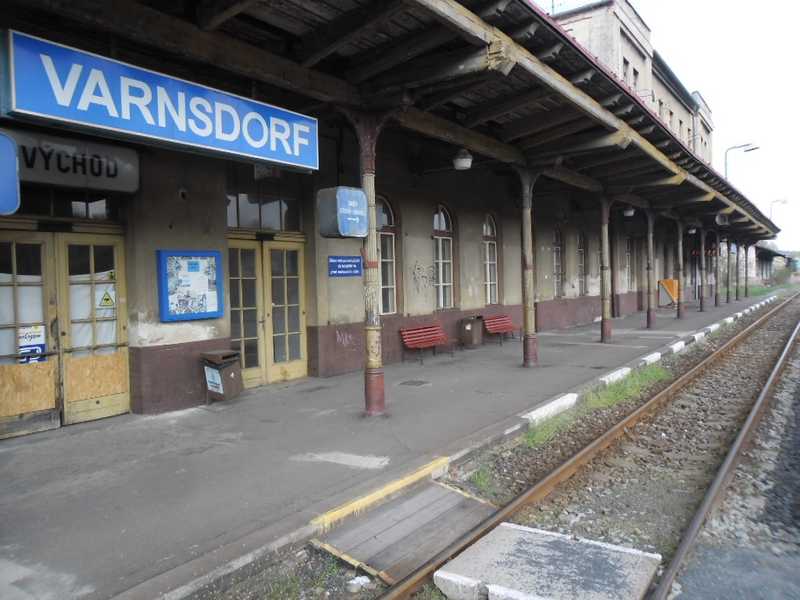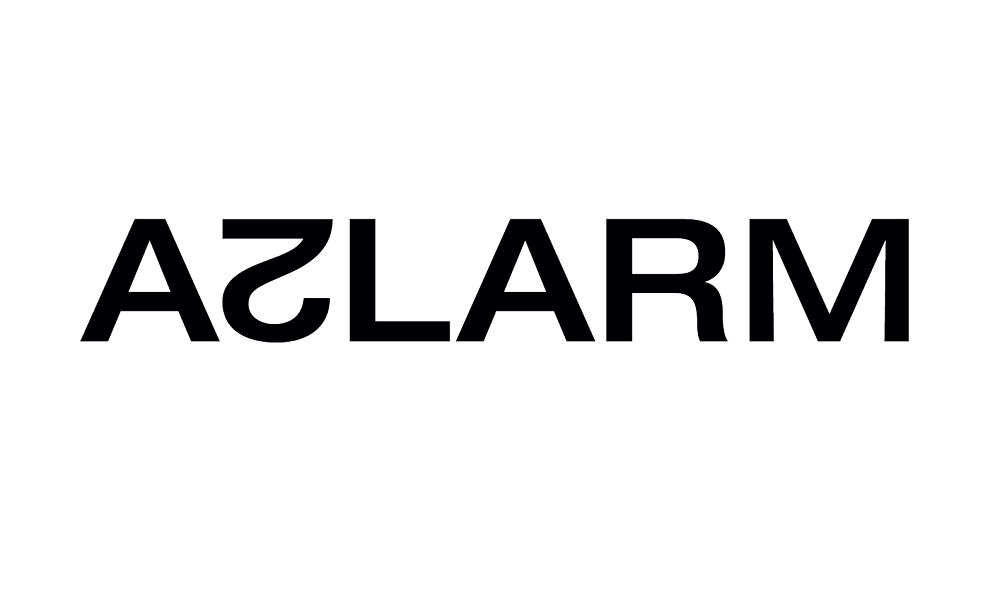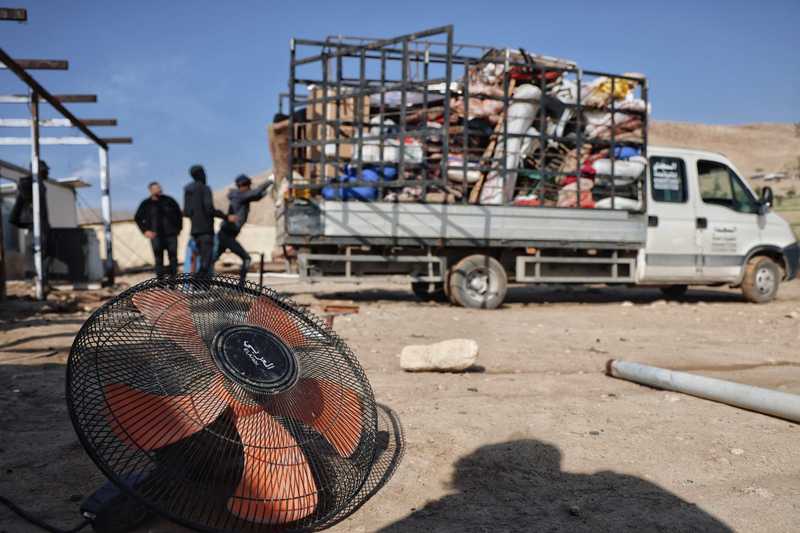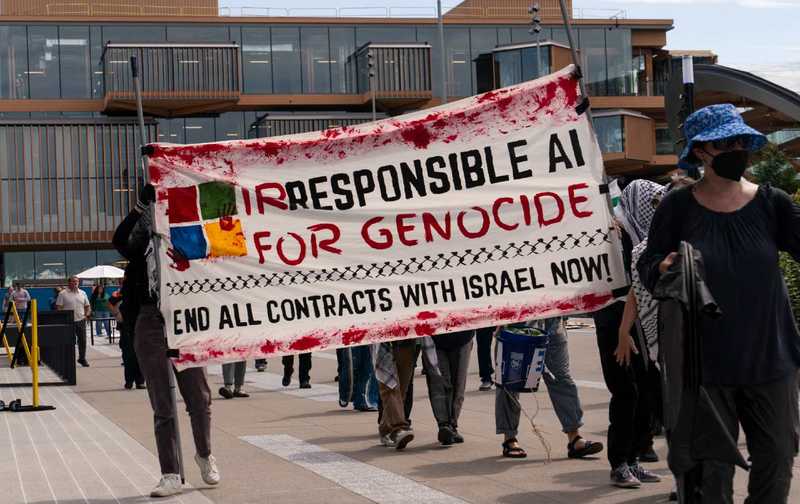
Blue, green and orange – these are the colors of three concrete blocks of flats from the once-infamous ghetto on Kovářská street in Varnsdorf, a town located in the north of Czechia. Today it’s a mostly calm and partially vacant “excluded locality”.
In the second half of last year, local businessman Lukáš Rak bought some of the housing units from the previous owner Pavel Troch, with the intention to renovate. “Problematic” tenants in rent arrears were forced to leave their flats already in the summer. Later, in the autumn, other tenants, who had paid on time, had to leave too. Their contracts were only month-to-month, instead of the original three months, allowing for the almost immediate expulsion of tenants from their flats.
Rak seized this opportunity at the end of the first year of the Covid-19 pandemic, when he let the last tenant go as he began the reconstruction of the now-vacant flats. This happened against the backdrop of the debate on rent-freezing, or at least the postponement of rent payments in the Czech Republic in the spring of 2020, which resulted only in the possibility to postpone until the end of the year. That was not enough to help most low-income households.
From the perspective of the Roma families who used to live in Kovářská, the whole debate on the protection of tenant’s rights in pandemic times is misguided. People in housing distress – especially if they are Roma – are commonly overlooked. Why should a global pandemic change anything about that? For these people, the Czech state’s declaration of a state of emergency unfortunately changes nothing.
On the way to Varnsdorf, we learn from the journalist and writer Markus Pape, who drew our attention to the situation in Kovářská, that the Czech anti-Roma vocabulary has been enriched with a new term – we now hear “inadaptable” (nepřizpůsobivých) instead of the original “unusable” (nepoužitelných). If this was a gesture towards greater political correctness, it’s definitely not a successful one.
The end of the fairytale about Roma
Iveta Balážová is still living with her husband and three children in one of the officially vacant flats that are intended for reconstruction. Without any contract. She would like to pay the rent, but there is no one to pay it to, she has not even received a new account number. She has become a squatter in the house in which she worked as a cleaner and paid rent for years.
Nearly all furniture has been removed, so that the family does not lose it in the event of a sudden eviction. The children are sleeping on mattresses on the floor in their room; in the kitchen, only a table remains. “Ukrainians are already cleaning up the blue one, I am afraid they are going to come here.” Balážová points to the opposite block. Before Christmas, she was not sure whether she was not going to end up on the street, as she was threatened by the new owner through mediators. Their situation is not yet tragic, but could collapse any day.
Everything could have been resolved very easily. In June, the town of Varnsdorf issued a call for the lease of social housing to people in housing distress. These flats were renovated for this purpose using a European grant.
However, the officials and politicians at the town hall do not consider the situation of the Baláž family to be urgent enough to offer them one of the seventeen social flats. At the moment, only four studios are available and these are unsuitable for larger families. The mayor states that families with children from Kovářská do not meet the conditionality of the European grant that covered the reconstruction of the social flats.
Roland Solloch, the mayor-and-priest in one, refers to the fact that the family has been offered alternative accomodation in a hostel set up by the town on T. G. Masaryka street. This emergency accommodation would ruin the Baláž family budget. For the five members of the family, three of whom are adults, the monthly rent in a city-run hostel would cost CZK 15,600 (around €600). They would have only a few thousands Czech crowns left for food, transport and other things.
The Baláž family also does not want to end up in a place where they would lose their privacy — their children would find it difficult to study. Overall they would pay a fortune for poor quality housing. The house is neglected, only accessible through a reception and the whole building could easily be mistaken for a prison. However, the town does not want to offer them other social housing besides a few rooms in this building.
“State subsidy rules for the acquisition of social housing are targeted at various groups of households in acute housing need. However, there are several of these subgroups and the number of people in housing need is always many times higher than the number of social housing units. Applicants for subsidies, such as municipalities, are then able to choose from the many applicants and usually prioritise favourite target groups, such as seniors,’ says Vít Lesák, an economist at the organisation “Platform for Social Housing”. According to him, there is no danger that Varnsdorf could lose subsidies if they provide an apartment to families in a similar type of situation as the Baláž family. Nor is it true that the families do not meet the criteria the town hall publishes on its website.
Latent racists often argue that they do not care about a person’s skin colour, but whether they make their own living and whether their children attend school. The Baláž family is a textbook definition of this category of “decent Roma”. For years, Mrs Balážová and her husband have been working for the same town which now refuses to provide them with other housing than a hostel. “I don't want to be dependent on the state, there are only problems with that and you are constantly having to prove something,”
Balážová explains her resistance to depending on social benefits. Her husband has been working for the Varnsdorf municipal services for fifteen years, and although she has a partial disability pension, she has to manage two part-time jobs as a caretaker and cleaner. Both of them have been working without interruption for many years. Balážová, who quit vocational school in her last year when she met her future husband, places great importance on her children’s education and wants all of them to at least obtain a vocational degree. At the same time, she is well aware of the paradox: she is in work and does everything “as she should”, but in the end it does not pay off. “I think it's a reward for the fact that I have worked, paid my rent on time, wasn't dependent on social benefits, and raised my children decently,” she thinks aloud in her furniture-less kitchen.
We were unable to obtain a comment from mayor Solloch, but after a series of attempts, on the day we visited Varnsdorf, he at least responded by email to Markus Pape, who had previously asked him to comment on the situation. In the email, the mayor stated clearly: “The city meets [these residents’] needs by offering help in negotiations with the employment office, social services, looking for housing vacancies (outside Varnsdorf – which they refuse). The town has no obligation to provide housing. We have a long queue of citizens waiting for a council flat (the Roma do not understand this and want everything right away). I am sorry about the situation, but everyone knew in advance that they would have to leave their homes and they did absolutely nothing. They even demolished the new owner’s flat before they left. You probably understand that I, as mayor, will not offer them newly renovated flats, which they will immediately destroy. However, they are not entitled to them according to the subsidy rules. In an emergency, there is a hostel that the city offers, but, again, they do not want to accept this, because living there they would have to follow certain rules.”
In his answer, the mayor and the priest of the Old Catholic Church unscrupulously throws all the inhabitants of Kovářská into the same category. According to Balážová herself, as well as other people from her street, she has been looking for housing ever since she learnt she would have to move out. She even saved up money for a deposit, which can often be an obstacle. The mayor obviously describes the reality as it suits him. In the case of Balážová, he himself promised a municipal flat for her family to the media, which means that he was aware of the fact that the town bears some responsibility.
The method of the declared assistance, in which the town tries to find housing only outside Varnsdorf, is also peculiar and goes directly against the principles of social services, as stated in the law. By law, social services should act in such a way as to “avoid exacerbating the unfavorable social situation and strengthen inclusion” – which is definitely not the case with forced evictions moving residents out of town, especially if officials deliberately help people find housing only outside Varnsdorf. Finally, the fundamental question the mayor does not address and at the same time must be aware of, is the racism and stigmatization of the people from Kovářská, which limits their possibilities to find housing. But this clearly does not bother him, because he himself reproduces prejudices against both the Roma and the people from Kovářská.
The ghetto and the system
Today, Kovářská looks very orderly and its terrible reputation in Varnsdorf and the surrounding towns seems incomprehensible to people from elsewhere. But it hasn’t always been so quiet here. The story of this small excluded locality is partly the story of the neglected housing question in the Czech Republic. In recent years, the government has tightened and reduced housing benefits as part of the fight against the poverty industry and allowed cities to introduce zones without subsidized housing; however, it did not address the plight of people in need at all. The very reason for the existence of the poverty industry, which involves a number of different ways of abusing the poor, has not disappeared.
In the 2000s, the blocks of flats in Kovářská belonged to the local textile company Velveta and served to accommodate its employees. They were later sold to Jan Němec and Pavel Pražák; mostly Roma and other low-income people began to move in. Initially, according to Iveta Balážová, who has lived in the house for over twelve years, life here was bearable and even pleasant and the houses were well maintained. But then the owners calculated how lucrative it was to cash in on housing benefits, which were not capped at the time, so you could get support from the state for housing three people in a moldy cellar.
As many people as possible were crammed into the houses, and the buildings’ appearance and maintenance were no longer a priority to the owners. They started making millions of Czech crowns. The more people, the more money. “For example, twelve people from the settlements lived in one studio and paid CZK 20,000. The owner pocketed all the money directly from the social services. Because he saw it was pouring in, he didn't care whom he housed there,” comments Marie Hučková, who at one point lived in one of the blocks of flats. She herself now plays a role that either the town hall or an NGO that takes care of the homeless should fulfil.
The result was overcrowded housing, neglected common areas, alcohol, frequent fights and police interventions. Combined with the then-ongoing economic crisis and the huge levels of unemployment that particularly affected the Ústí nad Labem Region on the edge of which Varnsdorf is located, this meant an increase in racial tensions, eventually leading to a series of racist marches with a high participation of cross-country Nazis and locals.
Balážová does not like to remember these times, but when she reflects on when Kovářská became a place with such a frightening reputation, she returns to the period of racist marches and the peak of the local poverty industry. When looking for a place to live, all you have to do is say the word Kovářská and the lease negotiation will end before it starts. No one wants people from here. Balážová has — perhaps surprisingly — a certain sympathy for this: “The first wave of people who were leaving Kovářská included defaulters and all kinds of people. We are decent, but they all hear ‘Kovářská’ and think who knows what,” she describes the difficulties in finding housing, which she and her family have been experiencing since September. “If they are not afraid that you will not pay them, they are afraid that you will destroy the flat or bring in cockroaches and bedbugs. You can promise whatever you want.” One group of people from Kovářská, however, has received alternative housing from the city immediately and without a need for negotiation. If you ask how they deserved this privilege, you have to make do with the answer that they were white retirees.
Less than a hundred meters from the now demonized blocks of flats there is a local pizzeria, Priština, which is run by Albanian owners. When we stop here for lunch, the curious waiter soon identifies us as not being locals. As soon as he finds out that we are in Varnsdorf because of Kovářská, he immediately starts to talk: “Kovářská? I call it a ghetto, and I don't mean it in a wrong way.”
He explains that just as he is serving us, a number of Roma from the discussed blocks of flats help out in the back of the kitchen and he does not have a single bad word for them. “They are proud of their work. They used to sit around here, but that is no longer the case,” he states, noting that about twenty Roma from Kovářská work part-time in his restaurant and he basically has nothing to complain about. On the contrary, thanks to them, his restaurant is able to relatively prosper, even in the times of Covid. The Roma from Kovářská work for him part-time and deliver pizza and other food to the surrounding areas, mainly to Germany.
When the town hall fails
Where did other Roma families, who had to abruptly leave Kovářská even though they were not in the category of problematic tenants, go? Some of them live in a nearby building, a former sawmill. These are unapproved, non-residential premises that have a frightening effect even on journalists who, over the years, have seen the standards of living in Předlice, Krupka, Přednádraží in Ostrava and many other hostels. The Novotný family, with seven children, is crammed into a room with walls made of plasterboard. They pay CZK 10,000 (around €380) per month, in cash and without any kind of contract. They, too, found zero sympathy at the town hall and were told that no one will help people from Kovářská.
“They said we do not meet the conditions for getting a council flat, because I am working. So we had to find this place ourselves just overnight”, explains Helena Novotná and also states that the town hall encouraged her family to leave Varnsdorf and move to Šluknov or to a hostel in Liberec. “But I have a job here and my children go to school here. And people from Kovářská are not wanted in Šluknov either.”
Mrs. Novotná also works for the town. Nevertheless, she cannot find anything but this undignified place for more money and without the possibility of social benefits. Without a contract, she does not have a proof of rent payment and therefore is not entitled to anything. Hers is not the only family that has ended up here after being expelled from Kovářská. There are around fifty people living in this building – together they use an unfurnished kitchen, one toilet, and one shower.
It is obvious to us that some more families from the last wave of evictions must live someplace else. And indeed. Marie Hučková, a former tenant from Kovářská who now lives in a former railway house which she rents from Czech Railways, took on three families with around twenty members, most of them children. This woman with a strong character basically fulfils the role of the town hall and when her wider family had nowhere to go before Christmas, she set up a kind of social housing for them.
She saw the owner of Kovářská going round the flats and telling people to leave immediately, and she doesn't like to remember it. “He didn’t knock, he just kicked the door in, even though all these people were paying rent properly.” There was no point in talking to him, his answer was clear: he doesn’t care about the future of the tenants, the flats belong to him and he can do whatever he pleases with them. He also allegedly told the tenants that if they wouldn’t cooperate, he had people for these “situations”. According to Hučková, he was referring to his contacts with the mafia.
“If it weren't for me, the children would already be in children’s homes and institutions and others would be on the street,” Hučková thinks about the three families to whom she opened her doors, adding that she couldn't leave people on the street over Christmas. However, the current situation exhausts her and her loved ones – she thought that it would be temporary, perhaps just a week, but it has already been over two months.
Hučková is one of the eight women who went to the town hall in November and showed their disagreement with the fate of the people from Kovářská. Two of them eventually obtained a meeting with Mayor Solloch and Deputy Mayor Jiří Sucharda, who is in charge of housing politics. During the forty-five-minute meeting, the men thanked Hučková for taking on so many people and begged her to hold on a little longer and, most importantly, not to hold any more demonstrations and not to communicate with the media. She heard promises from councilors that the town would soon find housing for the families she was temporarily helping. But more than a month has passed since the meeting and neither the Mayor nor the Deputy Mayor answer her calls, while three families from Kovářská have not yet found another home.
The Mayor’s office is always telling her the same thing: the Mayor is in a meeting, the Deputy Mayor is not here, no one is available. That was also the experience of the authors of this article. Neither calling nor writing to request a meeting with the Mayor or the Deputy Mayor led to anything – we received no response at all. None of the leading representatives of the town hall wanted to explain the town’s position. It is clear from the interviews we led in Varnsdorf that they do not seek any media publicity.
To Hučková, the intention of the town hall is clear. It is to gradually push the Roma from Kovářská out of Varnsdorf, including those who were born here. Otherwise the town would allocate some of the council flats to the families she is now accommodating. “The mayor told me they do have flats, but they are not intended for families that found themself without a roof over their heads, but for the homeless. Only for certain homeless people. I told them that these people are now homeless too, they have nowhere to go.” Hučková shakes her head and says she is completely exhausted.
Let’s not forget that the town of Varnsdorf owns a total of 600 flats. Based on the experience of the people from Kovářská, it seems that although Varnsdorf has built council flats with EU support, they are intended for other social groups than the Roma from the ghetto. Mrs. Hučková’s sister sums up the situation laconically: “The town hall is happy that we are here, they got rid of us and that is the end of it.”
UPDATE from January 28, 2021
The Baláž family was evicted from their flat in Kovářská in the beginning of January. Together with others, they moved to the house of Marie Hučková that had already counted 25 people. The Baláž family was later promised housing by a Vietnamese businessman, but the details are still unclear. Marie Hučková, who took the families under her roof, could not mentally deal with the situation anymore and her family is looking for housing in Rumburk, eight kilometers from Varnsdorf. However, during the time when several other families lived with her, she incurred a service charge debt. The town hall has at least promised to help her out with the debt. On Thursday, January 28, a demonstration of the “Decent Housing Initiative” (Iniciativa za důstojné bydlení) took place and was attended by several dozen activists from Prague, including the former ombudsman Anna Šabatová, who spoke at the event and reminded the town hall of their legal obligation to help their homeless citizens. Activists also brought material aid and the family was handed over the proceeds from the public collection. Several local Roma also took part in the demonstration.






